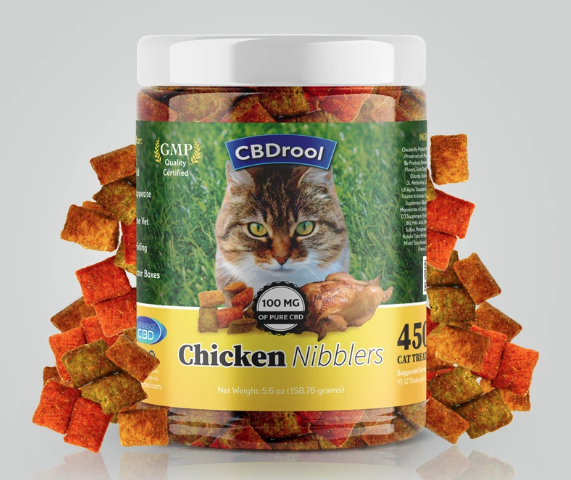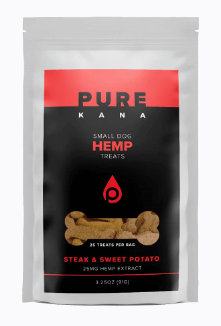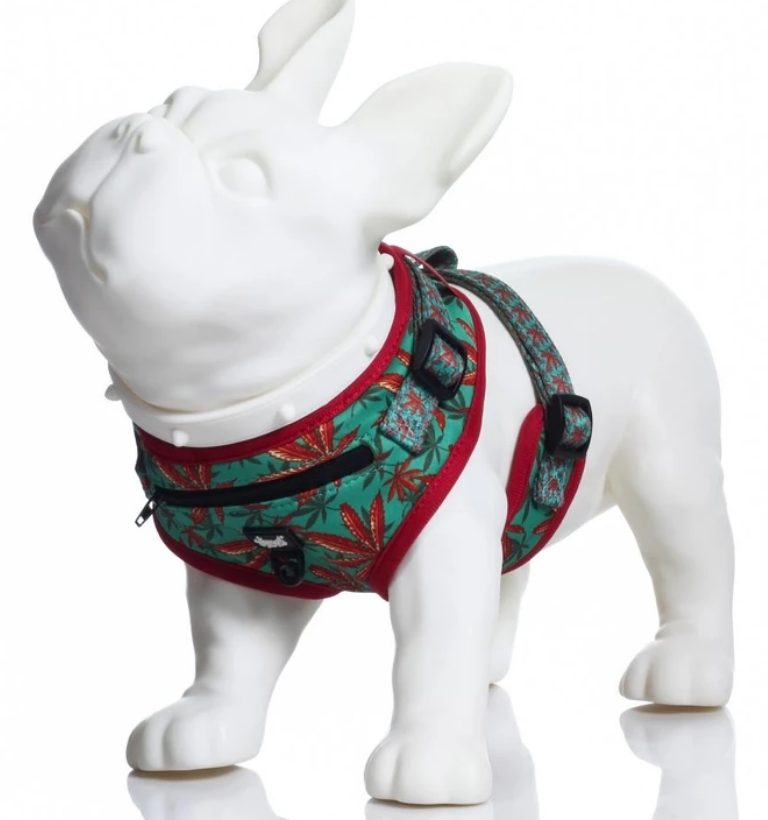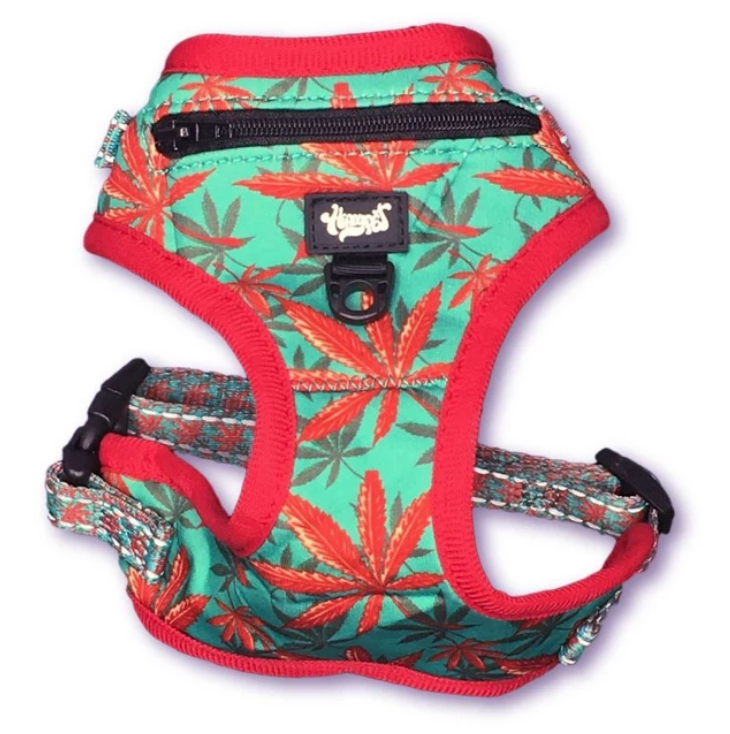ANIMAL HEALTH
CBD Oil For Dogs : What You Need To Know About CBD Oil
by Dr. Edele Grey
Certified content.
This guide has been written and verified by our veterinary advisor.
Approved By: Dr. Edele Grey, DVM
Vets are being asked more and more by clients about cannabidiol (CBD) oil and whether it may help their fur-babies. Given the recent positive publicity of CBD oil in human medicine it’s a natural progression to want to provide these same benefits for ailing pets; particularly those with painful diseases.
So we’ve put together a comprehensive guide about the use of CBD oil for dogs for all the fur-parents out there.

What Is CBD For Dogs?
The cannabis plant, Cannabis sativa, has been in documented use for millenia, however cannabidiol (CBD) was only isolated in the early twentieth century. The cannabis plant is probably best known as “marijuana”, however, “hemp” has also been used to produce rope and clothing throughout history. While most of the information about the medicinal benefits of cannabinoid products are anecdotal, there is increasing scientific evidence of these products’ efficacy in managing medical and behavioral disorders in dogs.
CBD oil is a non-psychoactive substance in the cannabis plant while tetrahydrocannabinol (THC) is the constituent that provides the “high” we attribute to marijuana. Strictly speaking, marijuana contains more than 0.3% THC while hemp must contain less than 0.3% THC.
Both CBD and THC are cannabinoids that work on the endogenous cannabinoid receptor system, which is responsible for helping the body to recover from stress and to regulate blood pressure, muscle tension, and other physiological processes.
CBD also has the advantage of not causing intoxication while giving relief from pain, inflammation, epileptic seizures and anxiety. Most CBD products are derived from hemp and contain little to no THC which is toxic to our fur-babies.
What Is CBD Oil?
Why your veterinarian may not be interested in discussing CBD oil with you?
Many vets have experience with treating our canine buddies for marijuana toxicity which can give us cause for concern about using the cannabis plant in our pets. Couple these experiences with lack of familiarity with CBD and the legal issues that surrounds cannabis-derived products; some veterinarians may not feel comfortable advising you about the use of CBD for your pup’s pain.
A study published just this year surveyed 2,130 veterinarians and found that 61.5% of respondents felt they could discuss the use of CBD with other veterinary colleagues, yet only 45.5% felt comfortable discussing its use with clients. Clients most commonly ask about using CBD products for pain relief, anxiety and seizures in their pets, yet there is little empirical research on their use in veterinary patients and there are currently no FDA approved products available.
How Does CBD Affect Dogs?
Human studies have shown that cannabidiol can help reduce inflammation, pain and even tumor size while also reducing seizure frequency and severity. Cannabidiol influences many physiological and neurological processes within the central nervous system of mammals through the endocannabinoid system. This system is important in maintaining healthy processes within the body by regulating pain, inflammation and our pups’ immune systems. While studies into how CBD affects dogs are lacking, both ourselves and our best fur-friends have the same endocannabinoid system, though dogs may have more receptors making them more sensitive to CBD than us humanoids.

Is CBD Safe For Dogs?
CBD is hailed by many as a wonder-drug but how safe is it for dogs? Nothing in the world is completely safe! Having said that, CBD is generally considered safe in both humans and animals8 and pets respond in a similar way to humans. Initial veterinary studies have suggested that CBD is safe though further studies are required to firmly establish this fact. Dogs can be more sensitive to the effects of cannabidiol so you should start with low doses and speak with your veterinarian first. As CBD is derived from hemp there is minimal or even no THC, thus your pet won’t get “buzzed”.(3)
What To Watch Out For When You Give Your Dog CBD!
CBD is natural and in humans, high doses have been shown to be safe. There are still some negative side effects that may affect your dog.
These include:
Gastrointestinal Distress
Of course, vomiting and diarrhea are some of the most common side effects you might expect to see. If your dog has a sensitive tummy, use a tiny dose at first to see how they cope.
Tremors
Some pets may have ‘the shakes’ or tremors after taking CBD, you should consult your vet if you see these signs especially if you are using CBD to try control your pup’s seizures.
Dry Mouth
CBD has been shown to reduce saliva production. You might find you need to top up your fur-baby’s water bowl more frequently.
Low Blood Pressure
Human CBD users have reported light-headedness so your pet may seem a little dizzy.
Lethargy Or Drowsiness
Some pet parents using CBD to sooth anxious dogs have found that at higher doses, their pooches seem sleepy.
Interactions With Other Medications
You should always speak with your veterinarian if your pet is taking other medications as CBD may interfere with their liver’s ability to metabolise some other drugs.
Risks Of Using CBD Oil For Dogs
As yet, there have been no studies with conclusive proof of the safety of CBD in our furry friends.
However, in 2016 a study suggested that CBD may be safe enough for further research in clinical populations. In this study, CBD was given in capsules, tinctures or topical creams with the best absorption and bioavailability seen with tinctures. There are as yet no FDA approved CBD products so what doses are toxic is unknown. Start out with small doses in consultation with your veterinarian and increase if no ill effects are seen.
Hemp Oil Vs Marijuana
Your dog won’t get “High” from CBD oil.
The fear on every fur-parent’s mind, will my pet get “high” if I give CBD oil?
The short answer is no!
As mentioned before, CBD is derived from hemp plants that contains tiny amounts of THC. High concentrations of THC is what gives the “high” when taking marijuana and is potentially fatal to our canine friends. Hemp contains less than 0.3% THC while most marijuana strains contain at least 15% THC6. CBD acts more as a relaxant and doesn’t have the same psychotropic properties as THC, to be completely sure you can purchase CBD products that have all of the THC removed. These are hard to find though so a product’s “Certificate of Analysis” should never be over 0.3%.
What Medical Conditions Can Be Helped With CBD For Dogs?
So now we’ve broken down the basics about CBD, it’s time to find out what conditions can CBD be used for in our furry friends. While studies into CBD as a treatment for our canine companions is limited, there are numerous benefits that may possibly be extrapolated from human research. CBD is not yet approved by the American Veterinary Medical Association (AVMA) due to the lack of supporting, scientific studies but anecdotally CBD has had some strong positive results. Colorado State University are leading a number of studies into the potential uses of CBD for dogs.
The most common ailments CBD has been used to treat are seizures and chronic pain such as that caused by arthritis or cancer. CBD is also reported to help pups cope with stressful situations such as fireworks or in cases of separation anxiety.(4), (5)
CBD Can Treat Seizures And Epilepsy
Epilepsy is one of the most common neurological disorders vets see in dogs and seizures are distressing for both dog and fur-parent alike. In 2017, the American Kennel Club (AKC) Canine Health Foundation (CHF) launched a CBD research drive to improve knowledge in this area. CBD has been shown to reduce seizure frequency and in some cases, epilepsy sufferers have entered remission from seizures while taking CBD.
One research group is currently investigating the use of CBD oil in epileptic dogs with positive initial results. In children with treatment-resistant epilepsy, one study found an 84% reduction in seizures after taking CBD. Unfortunately for many pets with treatment-resistant seizures or those dogs that have such terrible side-effects from traditional medications the sad reality is euthanasia may be their only option, but with these initial results, there are promising implications for the quality of life of epileptic dogs and their owners.(6) , (7), (8)

CBD Relieves Pain
One of the most lauded uses for medical marijuana has been for its pain-relieving properties. CBD is an active component in suppression of inflammation and thus pain. Human studies have not provided conclusive proof of pain-relief in clinical cases as yet. Pancreatitis is inflammation of the pancreas and can be a potentially fatal illness for our fur-babies, one component of treatment is adequate pain control, which, can be challenging in severe cases.
CBD may provide another pain-relief modality for veterinarians. One study in mice has shown that treatment with CBD, reduced enzyme activity in cases of experimental, acute pancreatic inflammation coupled with reduced pathological changes due to CBD’s anti-inflammatory action. Despite the less enthusiastic clinical evidence supporting CBD, preclinical trials have had some promising results, in both animals and humans.
CBD Can Prevent & Fight Cancer
Cancer, another terrible disease that proponents of medicinal marijuana claim can be treated, but is this true? The answer is not quite so simple, a 2016 study into cervical cancer therapy revealed that purified cannabidiol can cause increased death of cervical cancer cells over extract of the whole Cannabis sativa plant.
These results are encouraging for our furry friends as cannabidiol doesn’t have the same levels of THC as the whole plant extract which would be toxic to our pets. Coupled with the results of a 2014 study that showed cannabinoids can increase the destruction of lung cancer cells are suggestive of possible anti-tumorigenic effects of cannabinoids.
CBD And Inflammatory Bowel Disease
Another relatively common disease manifestation seen in pets and humans alike is gut inflammation and often, NSAIDs are used to help reduce the associated pain and inflammation.
I’m sure many reading this are aware that a nasty side effect of NSAID use in pets can be an upset stomach or diarrhea which is counter-intuitive. Part of what provides the pain-relief is the actual anti-inflammatory properties of these medications, which cannabidiol has also been shown to possess. In a 2008 study, cannabidiol was shown to selectively reduce inflammation in mouse intestines which may indicate another possible use for CBD in pets.
CBD Oil And Chronic Inflammation : Auto-Immune Disorders
While research has yielded some of the positive actions of CBD in cases of chronic inflammation or pain in cancer patients, more recent investigations have shown that CBD may even be useful in auto-immune diseases such as multiple sclerosis in people. These studies are in their infancy, and all have been investigated on experimental models, but there are some promising results being published which could give hope to many sufferers of these diseases including our fur-babies.
CBD Protects The Nervous System
As our knowledge expands, our canine companions are living longer than their ancestors and as a vet, I’m seeing more cases of possible senility or neuro-degenerative disorders in our aging pets. Management and prevention of such disorders require much more extensive investigations in dogs, however, there are some promising indications for using CBD in human research. Alzheimer’s disease has been extensively studied in human medicine and some studies have shown cannabidiol to have a protective activity on neuronal tissue.
CBD’s Role In Cardiovascular Health
As you can probably tell at this point, CBD has diversely positive pharmacological activities and has been shown to protect against damage to blood vessels in diabetic patients. In rat studies, CBD can be effective in reducing acute damage caused during a heart attack. Further work is ongoing and more results are required before we can determine if and how CBD could help our pups.
CBD Oil For Arthritis Or Stiffness In Dogs
Arthritis is one of the most common and painful diseases I see in aging pets and so many of the recommended medications can have nasty side effects or not suit those with liver or kidney disease. Arthritis is a general term used to describe joint inflammation and degeneration.
A recent study by Cornell University researchers has found that CBD given twice per day can improve comfort and mobility in dogs that have naturally occurring osteoarthritis. In the same paper, in 55% of other studies involving non-steroidal anti-inflammatory medications (NSAIDs) the patients had adverse effects. In this study, no side effects were reported when patients were given CBD. Some of these results show that CBD may be an alternative treatment option for pet parents.
CBD Oil And Anxiety
Our fur-babies don’t understand why we have to leave them, usually to earn enough money to keep them in the lap of luxury. Every pet copes differently and some dogs have severe separation anxiety, causing them distress when left alone and may present in destruction of their beds or your home.
Human research into social anxiety disorder has shown that CBD does have some anxiolytic properties and patients reported lower anxiety levels following treatment with CBD oil. There are treats available commercially with CBD that claim to have these same effects in our canine sidekicks but conclusive research has yet to be published.
How To Choose The Best And Safest CBD Oil For Your Dog?
Cannabis oil is derived from the Cannabis sativa plant. You want to select a product that contains little or no THC (less than 0.3% at most), these products will not get your pooch “high”. If you suspect your pet has been overdosed with THC, you should take them to the vet immediately.
Remember, cannabis oil is not a cure-all and even though the risks are low, it may still be possible for your pet to develop a toxicity. Before selecting a product or starting to give our fur-baby a CBD supplement, I always advise that you speak with your veterinarian first.
4 Tips For Picking The Right CBD Supplements For Your Dog
Choose Organic
Where possible, choose organic CBD oil to ensure there’s no herbicides or pesticides that may harm your pets. If you can’t find an organic product then ensure there are no additives to minimize the risks to your pet.
Price And Potency
CBD supplements are not products to price shop. Higher quality products will be more pure and naturally, more expensive. Cheaper products may contain toxic substances or heavy metals which may impact negatively on your pooch’s health. CBD tincture is probably the best form to provide your pet with as you can control the dosage by each drop.
Analysis And Verification
To ensure you’re giving your pet the highest quality product, ingredients should be listed and you can check the manufacturing site for the certificate stating how much CBD is in the product. Third party, independent testing results may be available also.
Palatability
Finding a good quality product that your pup will enjoy can be a mammoth task. Commercially available treats may have a lot of additives and very little CBD contained within. CBD tincture may be a way around this for you if your pet is a picky eater; tinctures are potent, concentrated forms of CBD and thus not much is required and may be mixed with food or added to your pet’s favourite treats.
How To Introduce CBD To Your Dog?
Once you’ve found your preferred dosing medium for your pooch, be it oil, tincture, treats or capsules the next step is introducing this to your fur-baby’s daily routine. Always start with low doses, CBD can cause some gastrointestinal upset and dogs can be more sensitive to these side effects than humans. Most products will provide a basic dosing guide, but you should always discuss this with your vet first as your vet knows your pet better than the package instructions can.
Cannabis (CBD) Oil For Dogs
Ensure your purchase a low/no THC containing oil for your pet. You could add a small amount to your pet’s meal, mixing it in with kibble or wet food to ensure they eat it.
Capsules
These can be trickier to manipulate the doses, particularly for small pooches, and breaking capsules open can create quite a mess and waste of contents. You could consider this approach for larger breeds and for dogs that will eat medications mixed with food. The capsule forms however, as with many medications may be difficult to get your pet to take and may require actually putting it into your dog’s mouth which can be stressful for both involved.
CBD Dog Treats
Commercial treats may offer you a convenient and easily administered method of providing CBD oil to your fur-baby. Treats are by definition, tasty morsels that our pup’s love and will often do anything to receive. If your pooch is fussy, these treats could help entice them to try CBD and you can start with one per day depending on their size and your dog’s weight. One concern with treats however, is that they can be highly calorific and if your pet is prone to weight gain, your pet’s diet may need a little adjustment to allow these daily tidbits.
CBD Tincture
Potent tinctures can allow you to control the dose by a single drop for your pup and with such small volumes required your fur-baby probably won’t even notice the addition to their food or even water bowl.
Topicals
These creams and massage oils can be more difficult to dose for your pet and can be time consuming to administer as they will need to be massaged onto the skin or area affected. If you choose one of the topical options, ensure all the ingredients are safe as most likely your pooch will try get a taste of what your rubbing onto their body if they can.
Benefits Of CBD Dog Treats
Possibly the top benefit of commercially available CBD treats is that they’re designed for your dog’s taste buds and these biscuits will have your pup attempting all sorts of tricks to win a yummy tidbit. These treats are also packaged in a range of doses for dogs of all sizes and most will provide an easy to interpret dosing guide on the package.
One concern about commercially available products is the veracity of their claims. The FDA have not approved any form of cannabis for animals and have even investigated some companies for false claims of having CBD in their products7. You can check out a list of FDA warnings that expose some fraudulently claimed products on their website.(9)
CBD Oil Dosage For Dogs
The entirety of this article is meant to provide a guide for you and should not be taken as veterinary advice. I always advise that you speak with your veterinarian before starting any CBD containing treatments for your pet. You may find some vets resistant to the use of CBD oil but this can often be due to how little research has been performed in this area.
Research performed to date has shown that our canine companions have more CBD receptors in their central nervous system than we humans have; which makes our pets more susceptible to the effects of CBD. This means accurate and careful dosing is even more important for your pooch’s safety.
My advice is to always start at the lowest possible dose and work up to the dose that provides the desired effects.
Similar to humans, our furry friends are all individuals and can react in a variety of ways to CBD so your pup’s weight will give you a guide to how much CBD may be required but if your pooch is sensitive you may find that they don’t even need this much, so starting at a lower dose is a good idea. Slowly increase the dose you’re providing over a couple of weeks and if you notice any negative effects you can either stop or reduce the dose provided.
One company recommends giving your pet 1-5mg per 10lbs body weight for the first week. If your pet has never received any CBD containing products then start at the low end of this range. If there are no ill effects after a week, then dosing can be increased.(10),(11)
How Long Does It Take For CBD Oil To Work For Dogs?
It will take approximately 30 minutes for you to see the effects of CBD on your pet and if you’re pet is receiving CBD for painful conditions then they may need to receive CBD up to three times per day but always start with once a day dosing, it may take a number of weeks to reach therapeutic doses for these pets.
Dangers Of A CBD Oil Overdose
There are many claims that it is impossible to overdose on CBD, however it’s possible to overdose on anything, including water! More research is needed into this aspect of CBD administration and we recommend you only use a non-THC containing CBD oil for your pup.
The FDA state that if you suspect your dog has overdosed on marijuana that you should contact a vet immediately as THC can cause fatal toxicities in our pets. We’ve listed some signs to watch out for in pets that may indicate overdose:
- Lethargy or depression
Increased drooling
Vomiting
Agitation or restless
Tremors
Strange behaviors such as unusual aggression, staring at walls etc.
Is It Legal To Give Your Dog CBD Oil?
The answer to this question depends on your individual state’s laws, and your veterinarian will be able to advise you about this point. The 2018 Agriculture Improvement Act was passed by the Senate Agriculture Committee and seeks to relax the legal bindings surrounding hemp production and use.(12), (13)
A recent online survey performed through the Veterinary Information Network has revealed that two thirds of respondents said clients ask about the use of cannabis for pets at least once a month. The executive director of California’s Veterinary Medical Association explained the importance of inclusion of veterinary professionals in this area to minimize the distribution of misinformation. Californian veterinarians are no longer under threat of prosecution from discussing cannabis with pet owners.(14)
There is quite the mystery around cannabis products and their possible uses in animal therapy, largely due to cannabis being a federally illegal drug. Funding and access to cannabis has been limited for research due to the legal minefield surrounding it.
The American Veterinary Medical Association (AVMA) cannot take a firm stance on cannabinoid use in pets without such research and some vets may even risk their medical license by just discussing it’s possible therapeutic indications for pets.
In February 2019, however, the AVMA did publish a document titled “Cannabis: What Veterinarians Need to Know” to help vets advise clients if asked about cannabis for pets. The document also contains some more information about treating patients who may have marijuana exposure or intoxication. The document provides some explanations about cannabis, cannabinoids (THC and CBD) and high-CBD/low-THC hemp plants.
Recommendations are limited to results from veterinary-treated cases of marijuana toxicosis. The evidence to date indicates that pets will typically experience the effects within 3 hours but these signs could occur in as little as just 5 minutes or as long as 96 hours after exposure. This notice also noted that most cases of toxicities occurred in young puppies and often also coincided with other toxicities including raisin or chocolate ingestion.(15)
So, Where Do We Stand On The Use Of CBD Oil In Our Pets?
Unfortunately, there’s not enough conclusive evidence to prove safety and efficacy of cannabinoids in treating ailments in our pets. Having said that, some early indications are positive and there is anecdotal evidence of CBD’s efficacy in both humans and our canine companions. Further research is needed to provide more accurate information for veterinary professionals to advise clients about their pups health and what role CBD may be able to play in treating a variety of conditions.
References:
Russo, E.B. (2007) History of cannabis and its preparations in saga, science, and sobriquet. Chem. Biodivers. 4:1614-1648
Mechoulam, R., L.A. Parker & R. Gallily (2002) Cannabidiol: An overview of some pharmacological aspects. J. Clin. Pharmacol. 42:11S-19S
Gamble, L-J, J.M. Boesch, C.W. Frye, W.S. Schwark, S. Mann, L. Wolfe, H. Brown, E.S. Berthelsen & J.J. Wakshlag (2018) Pharmacokinetics, safety and clinical efficacy of cannabidiol treatment in osteoarthritic dogs. Front. Vet. Sci. 5:165
Kogan, L., R. Schoenfeld-Tacher, P. Hellyer and M. Rishniw (2019) US Veterinarians’ knowledge, experience and perception regarding the use of cannabidiol for canine medical conditions. Front. Vet. Sci. 5:338
Bergamaschi, M.M., R.H. Queiroz, Q.W. Zuardi and J.A. Crippa (2011) Safety and side effects of cannabidiol, a Cannabis sativa constituent. Curr. Drug Saf. 6(4):237-249
Meola, S.D., C.C. Tearney, S.A. Haas, T.B. Hackett and E.M. Mazzaferro (2012) Evaluation of trends in marijuana toxicosis in dogs living in a state with legalized medical marijuana: 125 dogs (2005-2010). J. Vet. Emerg. Crit. Care 22(6):690-696
Devinsky, O., J. Sullivan, D. Friedman, E. Thiele, E. Marsh, L. Laux, J. Hedlund, N. Tilton, J. Bluvstein and M. Cilio (2014) Efficacy and safety of epidolex (cannabidiol) in children and young adults with treatment-resistant epilepsy: Initial data from an expanded access program. American Epilepsy Society Abstracts
Bartner, L.R., S. McGrath, S. Rao, L.K. Hyatt and L.A. Wittenburg (2018) Pharmacokinetics of cannabidiol administered by 3 delivery methods at 3 different dosages to healthy dogs. Can. J. Vet. Res. 82(3):178-183
Porter, B.E. and C. Jacobson (2013) Report of a parent survey of cannabidiol-enriched cannabis use in pediatric treatment-resistant epilepsy. Epilepsy Behav. 29(3):574-577
Li, K. J.Y. Feng, Y.Y. Li, B. Yeuce, X.H. Lin, Y.N. Li, Y.J. Feng and M. Storr (2013) Anti-inflammatory role of cannabidiol and O-1602 in cerulein-induced acute pancreatitis in mice. Pancreas 42(1):123-9
Crippa, J.A., G.N. Derenusson, T.B. Ferrari, L. Wichert-Ana, F.L. Duran, R. Martin-Santos, M.V. Simões, S. Bhattacharyya, P. Fusar-Poli, Z. Atakan, A. Santos Filho, M.C. Freitas-Ferrari, P.K. McGuire, A.W. Zuardi, G.F. Busatto and J.E. Hallak (2011) Neural basis for anxiolytic effects of cannabidiol (CBD) in generalized social anxiety disorder: a preliminary report. J. Psychopharmacol. 25(1):121-130
Xiong, W., C. Tanxing, K. Cheng, F. Yang, S. Chen, D. Willenbring, Y. Guan, H. Pan, K. Ren, Y. Xu and L. Zhang (2012) Cannabinoids suppress inflammatory and neuropathic pain by targeting α3 glycine receptors. J. Exp. Med. 209(6):1121-1134
Lötsch, J., I. Weyer-Menkhoff and I. Tegeder (2018) Current evidence of cannabinoid-based analgesia obtained in preclinical and human experimental settings. Eur. J. Pain. 22(3):471-484
Currais, A., O. Quehenberger, A.M. Armando, D. Daugherty, P. Maher and D. Schubert (2016) Amyloid proteotoxicity initiates an inflammatory response blocked by cannabinoids. NPJ Aging Mech. Dis. 16012
Sindiswa, T.L. and R.M. Lesetja (2016) Cannabidiol rather than Cannabis sativa extracts inhibit cell growth and induce apoptosis in cervical cancer cells. BMC Compl. Altern. Med. 16(1):335
Haustein, M., R. Ramer, M. Linnebacher, K. Manda and B. Hinz (2014) Cannabinoids increase lung cancer cell lysis by lymphokine-activated killer cells via upregulation of ICAM-1. Biochem. Pharmacol. 92(2):312-325
Izzo, A.A. and M. Camilleri (2009) Cannabinoids in intestinal inflammation and cancer. Pharmacol. Res. 60(2):117-125
Capasso, R., F. Borrelli, G. Aviello, B. Romano, C. Scalisi, F. Capasso and A.A. Izzo (2008) Cannabidiol, extracted from Cannabis sativa, selectively inhibits inflammatory hypermotility in mice. Br. J. Pharmacol. 154(5):1001-1008
Elliott, D.M., N. Singh, M. Nagarkatti and P.S. Nagarkatti (2018) Cannabidiol attenuates experimental autoimmune encephalomyelitis model of multiple sclerosis through induction of myeloid-derived suppressor cells. Front. Immunol. 9:1782
Hampson, A.J., M. Grimaldi, J. Axelrod and D. Wink (1998) Cannabidiol and (-)Δ9-tetrahydrocannabinol are neuroprotective antioxidants. Proc. Natl. Acad. Sci. U.S.A. 95(14):8268-8273
Iuvone, T., G. Esposito, R. Esposito, R. Santamaria, M. Di Rosa and A.A. Izzo (2004) Neuroprotective effect of cannabidiol, a non-psychoactive component from Cannabis sativa, on beta-amyloid-induced toxicity in PC12 cells. J. Neurochem. 89(1):134-141
Stanley, C.P., W.H. Hind and S.E. O’Sullivan (2013) Is the cardiovascular system a therapeutic target for cannabidiol? Br. J. Clin. Pharmacol. 75(2):313-322
Walsh, S.K., C.Y. Hepburn, K.A. Kane and C.L. Wainwright (2010) Acute administration of cannabidiol in vivo suppresses ischaemia-induced cardiac arrhythmias and reduces infarct size when given at reperfusion. Br. J. Pharmacol. 160(5):1234-1242
Source: FLUENT WOOF
Search


CBDrool's Cat Treats | 100mg cbd
Take care of your pets’ anxiety and overall health with CBDrool. For all cat sizes, these treats are 100% safe and very effective for managing any arthritis, inflammation, pain, calming their anxiety, and fighting heart disease.
This package contains 100mg of CBD and is available in one flavor.
For ingredients, visit our Ingredients page.


Hemp Dog Treats (Small Dog) | Steak & Sweet Potato
Steak & Sweet Potato hemp-derived CBD dog treats
Homemade recipe to promote overall health
1 MG hemp extract per treat (25 treats per bag)
Created for small dogs, these treats are a bit more compact so that little pups can easily enjoy hemp too. Our recipe is special – it’s homemade and baked fresh in our PureKana kitchen. Your beloved pet is bound to completely fall in love with the flavor of these unique Steak & Sweet Potato Hemp Dog Treats.All treats are gluten-free, dairy-free, and soy-free.
Common uses for pet hemp treats include:
• Issues with separation
• Stress caused by noises (such as fireworks)
• Flying, car rides, and transport
• Mobility difficulties
• Nausea, sickness, and stomach issues
• Overall wellbeing and healthy aging
• Promoting a healthy fur coat and skin
• May help reduce a dog’s travel-anxiety, separation-anxiety, and more
PureKana.com

"STONER CHIC" CARIBBEAN LEAF HARNESS


Keep things breezy with our collection of products featuring the Caribbean Leaf print. Great design that combines a cannabis leaf with tropical colors. The Caribbean Print is available on all of our products leashes, V2 collars, harnesses, and seat belts. If you enjoy the sea side and find yourself drawn to the tropics. This collection is your entry point to get away.
HEADY PET

How CBD is changing the pet treat industry
Cannabidiol has recently crossed over to the pet market, and revenue is expected to grow to $6.7 billion by the end of the year. Are you watching this, veterinarians?
by Erica Tricarico
From grain-free to organic, pet treat ingredients continually evolve to meet the growing demands of pet owners. This is a trend veterinarians need to follow to stay in touch with clients, even if only to answer the occasional question.
“Pet treats have come a long way in the past 20 years,” says David Sprinkle, research director for market research firm Packaged Facts, in a recent issue of the trade journal Pet Food Processing. Pet store aisles now mirror snack aisles at supermarkets, with many products positioned as being ‘better for your pet.’ “Limited-ingredient products, grain-free options and superfood ingredients are all in high demand, with innovative new product entries hitting the market on a regular basis,” he says.
The increased desire by pet owners to feed their pets “natural” and nutrient-dense treats might explain why the U.S. pet treat market is expected to grow to $6.7 billion in revenue by the end of 2019, a 3.1% increase from 2018, according to Packaged Facts.
One driver of this pet treat growth is, of course, cannabidiol (CBD). Many pet owners are embracing the idea of using CBD to help improve their pet’s overall health and treat a variety of health conditions such as anxiety, digestive issues, chronic pain, mobility issues, inflammation or skin irritation.
Based on a 2019 survey, Packaged Facts reported that 39% of dog owners and 34% of cat owners like the idea of CBD for pets, 29% of both dog and cat owners are interested in purchasing CBD pet supplements, and 11% of dog owners and 8% of cat owners have already given CBD or hemp treats to their pets.
“CBD supplements are in high demand in human markets, credited with treating conditions ranging from anxiety to asthma. The use of CBD has crossed over into the pet market, with usage spiking after the passage of the most recent Farm Bill in December 2018, which took a significant step towards separating hemp and hemp-derived CBD from marijuana-based products,” Sprinkle told Pet Food Processing.
Although the FDA has approved one cannabis-derived and three cannabis-related drugs for use in humans (with a prescription), it has not approved hemp-derived substances for use in animals. Currently, no CBD products can be marketed legally for animal consumption. As a result, animal and pet food companies interested in using hemp or CBD in tHeir products have been advised to proceed with caution.
Source: VeterinaryNews.DVM360.com
CBD Oil for Dogs: What You Need to Know
by Randa Kriss
As with any pet wellness trend, when it comes to CBD oil for dogs, there’s a lot of information floating around online. Of course, you want to do what’s best for your pup, which leads to the question: What do I need to know about CBD oil?
The AKC’s Chief Veterinary Officer, Dr. Jerry Klein, explains what CBD oil is, what it does, and its safety concerns and side effects.
What Is CBD Oil?
CBD, or cannabidiol, is a compound found in cannabis and hemp. Dr. Klein says it is essential to note that in most cases, CBD does not contain delta-9-tetrahydrocannabinol (THC), the compound that gives marijuana its psychoactive properties. In fact, most CBD products are derived from hemp and not from marijuana.
How Does CBD Affect Dogs?
Currently, there has been no formal study on how CBD affects dogs. What scientists do know is that cannabinoids interact with the endocannabinoid receptors located in the central and peripheral nervous systems, which help maintain balance in the body and keep it in a normal healthy state.
What Dog Health Problems Can CBD Oil Treat?
While there’s no definitive scientific data on using CBD to treat dogs, there’s anecdotal evidence from dog owners suggesting it can treat pain, especially neuropathic pain, as well as helping to control seizures.
According to Dr. Klein, CBD is also used because of its anti-inflammatory properties, cardiac benefits, anti-nausea effects, appetite stimulation, anti-anxiety impact, and for possible anti-cancer benefits, although there’s no conclusive data on this use.
The AKC Canine Health Foundation (CHF) is sponsoring a study, through the Colorado State University’s College of Veterinary Medicine and Biomedical Sciences, that will evaluate the use of CBD in treatment-resistant epileptic dogs. The CHF hopes that this will be the first study to gain scientific data on the use of CBD in dogs with this condition
VIDEO: "Ask The Expert" - American Kennel Club
Possible Side Effects of CBD in Dogs
While there’s no scientific data on the side effects of CBD usage for dogs, there are potential side effects based on how CBD affects humans. To minimize any potential side effects, make sure you are following the proper dosage.
- Dry mouth: Research has shown that CBD can decrease the production of saliva. For dogs, this would manifest as an increased thirst.
- Lowered blood pressure: High doses of CBD have been known to cause a temporary drop in blood pressure. Even though the drop is small, it might create a brief feeling of light-headedness.
- Drowsiness: Dog owners have used CBD to treat anxiety. The calming effect of CBD can also cause slight drowsiness, especially when using higher doses.
Risks of Using CBD Oil for Dogs
The safety and risks of using CBD for dogs have not yet been researched. The U.S. Food and Drug Administration has not approved CBD and has not issued a dosing chart. Therefore, we do not know what size dosage would be toxic. Any medication or supplement carries the risk of a reaction. It is always advisable, when giving your dog something new, to start out with small amounts and then closely monitor the effects. And always check with your veterinarian first.
CBD Products on the Market
If you and your veterinarian decide that you should try CBD as a treatment for your dog, there are a few things to keep in mind when purchasing CBD oil. Not all oils are the same; you’ll want high-quality CBD oil to have a better chance of it working.
- Look for organic. If the CBD oil is not organic, it at least should not contain pesticides, fungicides, or solvents.
- Don’t price shop. The higher the quality and purity, the higher the cost. You don’t want to go for a cheaper option that could have toxic substances such as pesticides, herbicides, or heavy metals. Make sure your CBD oil is free of additives.
- Get the analysis. The manufacturer should provide a certificate that tells you the amount of CBD that is in the product. Many CBD products contain only small amounts of CBD. You’ll also want to make sure there is little or no THC in the product.
- Buy CBD as a liquid. You can buy dog treats containing CBD, but the best form to administer is an oil or tincture. This way, you can adjust your dog’s dose drop by drop.
The CBD Wellness Trend
Why are we hearing so much about CBD oil now? Dr. Klein points to the legalization of marijuana in many places, which has triggered interest in potential health benefits of marijuana-related products. “We are likely to see continued interest in CBD and an increase in research about its uses and efficacy in the coming years,” he says.
Learn more about the CBD study funded by the Canine Health Foundation.
Innovet created a product line of full spectrum pure hemp oils void of dangerous compounds. Their USDA certified organic oil is formulated especially for animals and is also third-party tested to ensure consistency and purity. Innovet offers more than 50 affordable products to help pets manage anxiety, pain, as well as other conditions. Get more information about Innovet’s CBD products.
Source: AMERICAN KENNEL CLUB

Cannabidiol (CBD) and horses: What is it good for?

photo: Cheryl Green
by Juliet M Getty
CBD. Whether you’re already using it, you’re thinking about it, or just plain never heard of it, it’s worth getting more familiar with. No, it is not the latest “snake oil” touting cures from hair loss to ingrown toenails. Instead, it is chemical messenger in the “endocannabinoid system”, a natural and crucial part of the body. Research on this system is extensive, with years of examination and hundreds of studies.
Chester is my 22-year-old horse. He suffers from arthritis in his hocks and knees and is now moving with much greater ease. Clients who have decided to try CBD for their horses have offered very positive feedback. Inflammatory conditions, such as arthritis and ulcerations are showing improvement, as well as pain relief from laminitis. Horses with anxiety or “sensitive” behavior, have a more relaxed demeanor. And, metabolic conditions may be potentially alleviated, which is quite exciting. While it’s too soon to tell if leptin and insulin levels are declining from CBD treatment, there have been studies showing how CBD reduces insulin resistance and obesity2, as well as appetite, in people with type 2 diabetes and metabolic syndrome.3
What is CBD and is it marijuana?
CBD is short for “cannabidiol”, one of more than 80 different cannabinoids found in the cannabis plant. CBD and THC are the two most studied, and this is where many misunderstandings stem from.
Cannabis sativa L. (genus, species, and subspecies) is the “umbrella term” for the plants known as hemp and marijuana. Marijuana is particularly high in THC, the cannabinoid that creates a psychoactive “high.” CBD, on the other hand, does not create this effect.
Hemp-derived CBD is not marijuana.
Although both hemp and marijuana belong to the Cannabis genus, their genetic composition distinguishes them to produce vastly different amounts of THC. Hemp-derived CBD is high in CBD and very low in THC (less than 0.3%).
Though hemp-derived CBD is legal in all 50 US states, thanks to the passing of the 2018 Farm Bill4, federal law does not preempt state law, and there are still some restrictions within various states5. Just as many cities throughout the country prohibit alcohol sales, there are local and state laws that restrict industrial hemp products. But bottom line, it is legal to purchase and consume hemp-derived CBD products. The FDA6 does not regulate it so it behooves you to choose a reputable company that is willing to disclose the source, extraction method, and analysis of their products.
What is the endocannabinoid system?
The endocannabinoid system (ECS) is a major signaling system that exists in you and your animals. It continually monitors any instability within the body and returns it to a state of balance or homeostasis so that the internal environment remains stable.
CBD and other cannabinoids are compounds that activate this system. Cannabinoids, both naturally produced by the body (endogenous), and those supplemented from cannabis (exogenous), act as “keys” to these receptors, turning on a variety of functions.
Within the ECS there are two main cell receptors — CB1 and CB2:
- CB1 receptors exist mainly in the brain and central nervous system. They impact areas such as appetite regulation, memory, emotions, and feelings of pain.
- CB2 receptors are concentrated in the gastrointestinal tract and peripheral nervous system (nerve cells outside the brain and spinal cord) and modulate immune cell functions. When activated, they help reduce inflammation.
Endogenous cannabinoids are produced when the body signals that they are required, but are quickly degraded. Offering CBD (exogenous cannabinoid) allows the ECS to work harder and be more productive to help us and our animals deal with health issues such as:
- Anxiety and depression7
- Insomnia8
- Pain and inflammation9
- obesity/increased appetite/leptin resistance10,11
- Metabolic syndrome/insulin resistance12
- Immune deficiencies and autoimmune diseases13
- Digestive disturbances/ulcers/colitis14
Side effects
CBD has a favorable safety profile15. If overdosed, it can have some mild effects. These can include drowsiness, decreased blood pressure, dizziness, fatigue, and diarrhea. If you or your animals experience any of these, you can cut back on the dosage. Long-term use appears to be safe, though further research is needed.
LET’S TALK HORSES
As of this date, there are few, if any, research studies that use horses as subjects. But I expect this will quickly change as more and more companies are selling CBD for equine consumption. In the meantime, anecdotal responses are highly favorable. From first-hand accounts of horse owners, hemp-derived CBD appears to stimulate the horse’s ECS in the same way it does yours. It is well tolerated, without any euphoric or adverse effects. Specific health conditions that CBD may improve, based on currently available studies with humans and laboratory animals include:
- Pain17 from arthritis18 or laminitis
- Anxiety during stall confinement19
- Stress during traveling and shows20
- Ulcers and leaky gut21
- Healing from surgery or injury22
- Immune system depression from oxidative stress23 experienced with Cushing’s disease
- Appetite regulation24
- Obesity25
- Inflammation, with the potential to reduce leptin levels26
- Insulin resistance23
Horse competition rules and testing
The FEI and the United States Equestrian Federation (USEF) have strict rules regarding medicating horses before events. Recently, the USEF announced that as of September 1, 2019, positive test results for cannabinoids will incur violations.
Since it is THC that is detectable by a blood or urine test, it is highly unlikely for a positive test result to occur since hemp-derived CBD contains only minute amounts of THC. Nonetheless, it is possible, so it is best to discontinue its use 7 to 10 days before an event. Even if you choose a CBD isolate or broad-spectrum product (which does not contain any THC), it is best to err on the side of caution by stopping before an event.
Choose a safe, quality product
First, know where the hemp was grown. Choose products grown in the US or Canada. If it was grown overseas with potentially relaxed growing standards, it could be contaminated with chemicals, bacteria, and heavy metals that put your health at risk.
To ensure a clean, safe product, it is best to buy CBD that has been tested and offers a Certificate of Analysis (COA) posted on the company’s website This document shows how the company meets and adheres to product specifications and standards of production.
Some other things to pay attention to with CBD products:
- Check the label for accurate CBD content per dose.
- Choose a product from an organic source.
- Look for percentage of THC on a provided COA.
CBD isolate, full-spectrum, or broad-spectrum?
CBD isolate means that the product contains only CBD with no other naturally occurring cannabinoids, including THC. That also means that other substances that are found in the plant, such as terpenes and flavonoids, have been fully extracted.
If you are undergoing a drug test for a job, it is best to use the isolate, or stop your usage of the full-spectrum product a week or two before the test.
Full-spectrum is a whole plant CBD, meaning that it contains CBD and other cannabinoids (less than 0.3% THC), as well as terpenes, flavonoids, and active essential oils.
Broad-spectrum products also contain the whole plant compounds like full-spectrum, but the THC has been removed.
The “entourage effect”. It used to be thought that CBD isolate was the best approach. But it is now better understood that the cannabinoids and plant compounds found in full-spectrum and broad-spectum CBD create a synergism where they work together to complement each other, offering a greater impact on health conditions.
It’s important to note that dogs and cats can benefit from hemp-derived full-spectrum CBD, even though they cannot tolerate THC from marijuana. The tiny amount of THC found in this product is safe may further increase the entourage effect.
Why is it so expensive?
It takes a lot of hemp plants to create a CBD oil (tincture). Products called “hemp oil” are not necessarily concentrated with CBD. Hempseed oil is a nutritious oil, high in essential fatty acids, but it is not a good source of CBD. Before you buy, read the label carefully to determine just how much CBD exists in the product.
What extraction method is best?
When researching a CBD product for you and your animals, it is best to know the extraction method used to remove CBD from the plant. Going through each method is beyond the scope of this article, but the approach that is most complete and the cleanest is a CO2 extraction. It uses carbon dioxide (CO2) to extract CBD from the plant to create products that are pure and very powerful.
How much CBD is in one dose?
The label should provide you with the amount of CBD per dose. But it can be confusing.
When using a CBD tincture, you should see the number of mgs of CBD in the full bottle. Some products can be very diluted, so be sure the manufacturer’s label is detailed and specific.Many tinctures will offer directions by the “dropper-full.” But getting a full dropper is not always possible or can be inaccurate. The best approach is to first determine the amount of CBD in each drop. By knowing how many mgs are in each drop, you can accurately dispense the desired dosage.
To do this, you need to know these three things:
- There are 30ml of oil in a typical CBD tincture bottle,
- A full dropper-full is 1ml, and
- There are 20 drops in a ml
Two examples:
1. CBD tincture that offer 2500mg of CBD in the entire 30ml bottle:
- Divide 2500 by 30 to get the number of mg per dropper-full (1ml). This calculates to be 83.3mg of CBD in 1ml
- Divide 83.3 by 20 to give you the level of CBD per drop. This calculates to be about 4mg per drop.
2. CBD tincture for pets that offers 250mg of CBD in the entire 30ml bottle:
- 250 divided by 30 = 8.3mg of CBD in one dropper-full (1ml)
- 8.3 divided by 20 = .42mg (slightly less than ½mg) of CBD per drop
Other forms of CBD such as pellets, gummies, capsules, and topicals should offer specific amounts of CBD per dose.
What is the best dosage?
Dosages are weight dependent and based on the severity of the situation. It is best to start slowly, and then increase the dose as needed. A little trial and error is necessary to find the right dose that is best for you or your animals. Keep in mind that it takes about 2 weeks for the body to experience relief and will continue to improve over time.
Dosage recommendations are not standardized. However, through research studies and applications, here are generalized daily guidelines. I have found that dividing the dose into two servings is better than administering once daily.
- Pets:
- Under 25lbs: 10mg
- 25 to 75lbs: 10 to 20mg
- 75 or more lbs: 20-40mg
- People:
- Less than 100lbs: 20 to 40mg
- 100 to 174lbs: 30 to 60mg
- Over 175lbs: 60 to 90mg
- Horses:
- Minis: 25 to 50mg
- Full sized (1100lbs): 75 to 170mg
- Large breeds: 120 to 200mg
How to administer CBD
There are several ways to provide CBD:
- Sublingual: Placing the drops under the tongue and holding them there for 30 seconds provides good bioavailability and kicks in quickly. This is difficult to do for animals and is not recommended since most droppers are made of glass and can cause injury if bitten.
- Oral: Adding CBD to food, swallowing a CBD capsule, or chewing a CBD gummy, will take the longest time for the effects to become apparent, but this method is longer lasting than under the tongue. Pellets (typically available for animals) that are extruded are better absorbed than pellets that use binders, providing improved bioavailability and hence, lower effective dosing27.
- Pulmonary: CBD vapes are available. While this has the highest bioavailability, it has the shortest duration of action. I typically do no recommend this for people with any respiratory conditions, since it could be potentially harmful.
- Topical: CBD is absorbed well into the skin and is beneficial for targeted areas28.
Bottom line
Even though experts have been studying for decades the benefits of CBD, there is still research that needs to be done, especially for horses. Nevertheless, the outcome thus far is encouraging, revealing long-reaching benefits on the natural endocannabinoid system, providing relief from mental and physical ailments that affect us, our families, and our animals.
Source: HORSE TALK
References
[1] Kogan, L., Schoenfeld-Tacher, R., Hellyer, P., and Rishniw, M., 2018. US veterinarians’ knowledge, experience, and perception regarding the use of cannabidiol for canine medical conditions. Frontiers of Veterinary Science, volume 10.
[2] Parray, H.A., and Yun, J.W., 2016. Cannabidiol promotes browning in 3T3-L1 adipocytes. Molecular and Cellular Biochemistry, volume 416, number 1-2, 131-139.
[3] Tarragon, E., and Moreno, J.J., 2019. Cannabinoids, chemical senses, and regulation of feeding behavior. Chemical Senses, Vol 44, pages 73-89.
[4] Everything you need to know about the 2018 Farm Bill (updated): http://bit.ly/2XhZuiI
[5] Is CBD oil legal in all 50 states? http://bit.ly/321o5M9
[6] FDA regulations of cannabis and cannabis-derived products. http://bit.ly/2JezpvH
[7] De Gregorio, D., McLaughlin, R.J., Posa, L., et al., 2019. Cannabidiol modulates serotonergic transmission and reverses both allodynia and anxiety-like behavior in a model of neuropathic pain. Pain, volume 160, number 1, 136-150.
[8] Maple, K.E., McDaniel, K.A., Shollenbarger, S.G., and Lisdahl, K.M., 2017. Dose-dependent cannabis use, depressive symptoms, and FAAH genotype predict sleep quality in emerging adults: A pilot study. American Journal of Drug and Alcohol Abuse, volume 42, number 4, 431-440.
[9] Hammell, D.C., Zhang, L.P., Ma, F., Abshire, S.M., et al., 2015. Transdermal cannabidiol reduces inflammation and pain-related behaviors in rat model of arthritis. European Journal of Pain, Vol 20, Number 6.
[10] Kunos, G., Osei-Hyiaman, D., Liu, J., et al., 2008. Endocannabinoids and the control of energy homeostasis. Journal of Biological Chemistry, volume 283, number 48, 33021-33025.
[11] Rossi, F., Punzo, F., Umano, G.R., et al., 2018. Role of cannabinoids in obesity. International Journal of Molecular Science, volume 19, number 9.
[12] Mastinu, A., Premoli, M., Ferrari-Toninelli, G., et. al., 2018. Cannabinoids in health and disease: Pharmacological potential in metabolic syndrome and neuroinflammation. Hormone Molecular Biology and Clinical Investigation, Vol 36, Number 2.
[13] Zgair, A., Lee, J.B., Wong, J.C.M., et al., 2017. Oral administration of cannabis with lipids leads to high levels of cannabinoids in the intestinal lymphatic system and prominent immunomodulation. Scientific Reports.
[14] Irving, P.M., Iqbal, T., Nwokolo, C., et al., 2018. A randomized, double-blind, placebo-controlled, parallel-group, pilot study of cannabidiol-rich botanical extract in the symptomatic treatment of ulcerative colitis. Inflammatory Bowel Diseases, Vol 24, Number 4.
[15] Iffland, K., and Grotenhermen, F., 2017. An update on safety and side effects of cannabidiol: A review of clinical data and relevant animal studies. Cannabis Cannabinoid Research, volume 2, number 1, 139-154.
[16] Medical cannabis – adverse effects and drug reactions. http://bit.ly/2Xcq6BE
[17] Cannabidiol: A new option for patients in pain? DVM360, September 2017, p 32-33.
[18] Malaita, A.M., Gallily, R., Sumariwalla, P.F., et al., 2000. The nonpsychoactive cannabis constituent cannabidiol is an oral anti-arthritic therapeutic in murine collagen-induced arthritis. Proceedings of the National Academy of Science USA.
[19] Maroon, J., and Bost, J., 2018. Review of the neurological benefits of phytocannabinoids. Surgical Neurology International, volume 9.
[20] Campos, A.C., Moreira, F.A., Gomes, F.V., et al., 2012. Multiple mechanisms involved in the large-spectrum therapeutic potential of cannabidiol in psychiatric disorders. Philosophical Transactions of the Royal Society London Series B Biological Science, volume 367, number 1607, pages 3364-3378.
[21] Couch, D.G., Cook, H., Ortori, C, et.al., 2019. Palmitoylethanolamide and cannabidiol prevent inflammation-induced hyperpermeability of the human gut in vitro and in vivo – A randomized, placebo-controlled, double-blind controlled trial. Inflammatory Bowel Diseases, Vol 25, Number 6.
[22] Styrczewska, M., Kostyn, A, Kulma, A., et al., 2015. Flax fiber hydrophobic extract inhibits human skin cells inflammation and causes remodeling of extracellular matrix and wound closure activation. Biomedical Research International.
[23] Booz, G.W., 2012., Cannabidiol as an emergent therapeutic strategy for lessening the impact of inflammation on oxidative stress. Free Radical Biology and Medicine, volume 5, number 5.
[24] Garamond, J.A., Whalley, B.J., and Williams, C.M., 2012. Cannabinol and cannabidiol exert opposing effects on rat feeding patterns. Psychopharmacology, volume 223, number 1, 117-129.
[25] Ignatowska-Jankowska, B., Jankowski, M.M., and Swiergiel, A.H., 2011. Cannabidiol decreases body weight gain in rats: Involvement of CB2 receptors. Neuroscience Letters, 490, 82-84.
[26] Tarragon, E., and Moreno, J.J., 2019. Cannabinoids, chemical senses, and regulation of feeding behavior. Chemical Senses, Vol 44, pages 73-89.
[27] Forefront Equine makes an excellent extruded CBD pellet without THC. Available on Dr. Getty’s Free Shipping Store: http://bit.ly/2KOL7Al
[28] Hammell, D.C., Zhang, L.P., Ma, F., Abshire, S.M., et al., 2015. Transdermal cannabidiol reduces inflammation and pain-related behaviors in rat model of arthritis. European Journal of Pain, Vol 20, Number 6.












